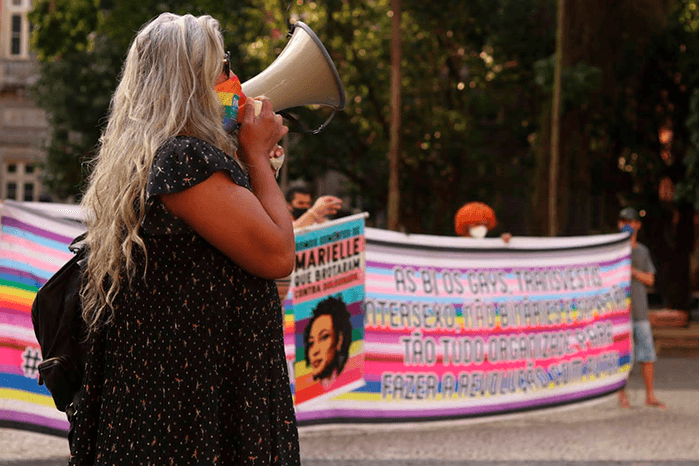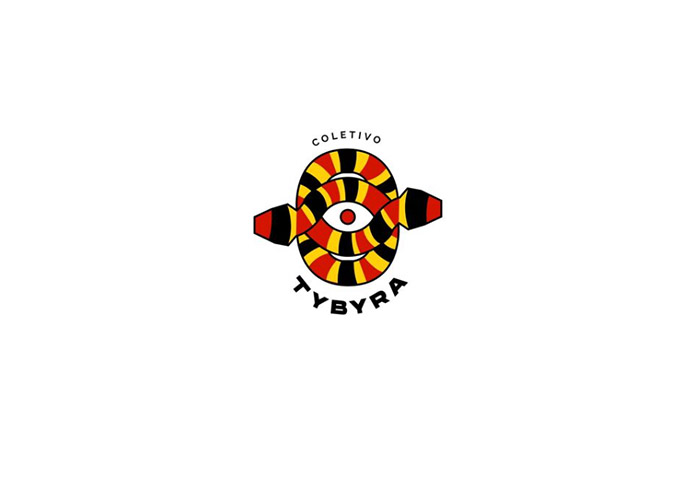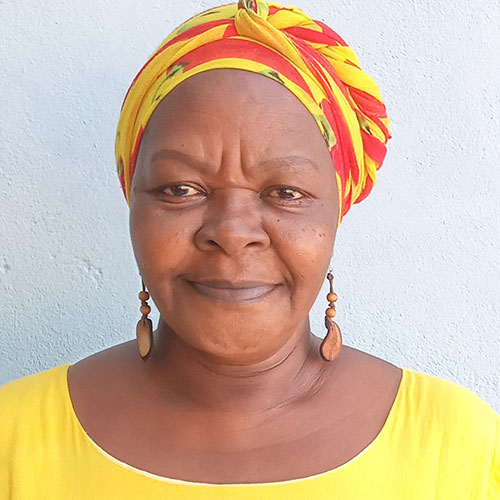Resistance in the South of Rio de Janeiro: the NGO Casa Nem improves the quality of life of LGBTQIA+ community
Nem House, founded by Idianare Siqueira, in 2016, welcomes and supports LGBTQIA+ people in situations of social vulnerability


Casa Nem (Nem House), founded by Indianare Siqueira in 2016, welcomes and supports LGBTQIA+ individuals who are facing social and economic vulnerability and often experience violence on the streets or even at home. Up to this day, this institution has already transformed the lives of hundreds of people in these circumstances. This project emerged as an extension of another initiative called ‘Prepara Nem,’ which focused on education by providing preparatory courses for transgender individuals to enter universities. Over time, the founder realized that some students were encountering housing and self-support difficulties, leading her to expand the project’s scope to offer greater support.
I had the opportunity to speak with Colle Christine, 24, and Lissandra Cardozo, 21, both managers at Casa Nem (Nem House), who shared details about the project and its significance in their lives.
Neuza Nascimento: What is the purpose of the project?
Colle: The project aims to uplift LGBTIA+ individuals from marginalization, empowering them to lead independent lives. It seeks to promote and encourage their access to higher education, facilitate self-sustainability, highlight their individuality and independence, provide political education, and teach them about their rights, including understanding what transphobia (discrimination against transgender and gender non-conforming individuals, whether intentional or not) and racism entail. Additionally, the project prepares them to navigate spaces where their bodies may not be wanted, enabling them to enter and exit these spaces while fostering a collective effort to bring about change within our community. Through embracing our diversity, we aspire to contribute to the pluralism of our bodies.
Neuza Nascimento: What activities does Casa Nem (Nem House) offer?
Colle: Apart from providing a welcoming environment, which is of utmost importance, Casa Nem offers Muay Thai, Capoeira, English classes, psychological assistance, and soon we will be introducing Crochet classes. Additionally, we collect and distribute essential food parcels for individuals who are not residents of Casa Nem but reach out to us for help.
Neuza Nascimento: Does Casa Nem (Nem House) have its own space?
Colle: Yes, we acquired this space after being displaced from several other locations. Casa Nem (Nem House) has previously been situated in Copacabana, Botafogo, and Lapa, and we have even resided in a school. It has been an empowering journey in our day-to-day lives. The current space, where the reception and activities take place, has been officially granted by the government initially for a five-year period, with the possibility of renewal for another five years.
Neuza Nascimento: Is there a team at Casa Nem? And if so, are they paid?
Colle: We have a communication team consisting of five members: myself, Duda, Douglas, Kira, and Odara. Our responsibility is to manage the social media accounts, seek donations, and promote the project and its events. There is also another group that oversees the management of the house, but ultimately everyone contributes and collaborates according to their abilities and capacities. Each member of the communication team receives a monthly stipend of R$400.00 (four hundred reais) funded through monthly donations. We are striving to mobilize our networks to extend this allowance to all residents, although it is not currently possible.

Neuza Nascimento: Does Casa Nem provide support externally?
Colle: Yes, we have a vast network. For instance, Casa Nem (Nem House) is part of and collaborates with FIST (Internationalist Front for the Homeless). Casa Nem supports FIST’s occupations, aids Maré girls, the LGBTIA+ Forum, and homeless individuals. We are also a member of REBRACA (Rede Brasileira de Casas de Acolhimento LGBTIQA+), a network that encompasses all LGBTQIA+ shelters in Brazil.
Neuza Nascimento: What are the criteria to become a resident at Casa Nem?
Colle: To become a resident at Casa Nem (Nem House), an individual must identify as part of the LGBTIA+ community and be in a vulnerable situation. The focus is primarily on trans people, as statistics show that they are the group that requires the most support. However, even if someone doesn’t belong to that specific group, if it is an urgent case, we assess the situation and provide assistance. If we are unable to accommodate them, we can refer them to other suitable places.
Neuza Nascimento: How many people are currently residing at Casa Nem?
Colle: Currently, we have approximately 30 residents, all from the LGBTIA+ community.
Neuza Nascimento: How do individuals find Casa Nem?
Colle: Some people reach out through social media platforms, while others learn about Casa Nem (Nem House) through acquaintances or various other channels. There are several ways for people to connect with us.
Neuza Nascimento: What are Casa Nem’s greatest achievements?
Colle: One of our biggest victories is that almost all the residents leave Casa Nem (Nem House) with their lives organized and they return to help those who are still in need. Individuals who passed the university entrance exam, thanks to “Prepara Nem,” have successfully enrolled in universities, graduated, and now have jobs. However, they never forget their time at Casa Nem and always come back as volunteers to offer support. Another significant achievement is the fact that we have individuals who were trained through the project because getting into university, in a way, can be seen as an easier path, but staying in that environment is challenging. I also consider securing our own headquarters as a major victory. We no longer fear eviction, the police at our doorstep blocking us, or people throwing things at us to force us out. We are no longer afraid of having our belongings tossed onto the street with nowhere to go. We are no longer afraid of being killed.
Neuza Nascimento: How is Casa Nem sustained?
Colle: First and foremost, we receive support through the EVOE Platform, where people make monthly donations. Additionally, we receive funds through Pix (a Brazilian instant payment system) and our bank account. We have individuals who believe in the project, believe in the LGBTIA+ community, and support the work and welcoming environment that Casa Nem (Nem House) provides. We also rely on various donations, whether it’s a sofa, a blanket, or recyclable materials that can be used for crafts. Everything is donated. Everyone contributes to the house in some way, whether it’s providing hygiene and cleaning products, lending a car or truck to collect essential food parcels or other donations. People help us in numerous ways.
Lissandra: We also generate income through Kuzinha Nem, a vegan cuisine project, in partnership with Palco Lapa 145 and Queer Brechó. However, it’s still not sufficient to fully sustain Casa Nem (Nem House). The physical maintenance of the house is carried out by us, the residents. We divide the responsibilities of managing and running the house, including cleaning and food preparation. The communication team, who also resides at Casa Nem, is responsible for institutional matters, and each person contributes a little. It’s a collective effort.
Neuza Nascimento: How does the surrounding community respond to the project?
Colle: The surrounding community is not supportive of us. We face prejudice, racism, and transphobia. We are located in Flamengo, in the South Zone of Rio de Janeiro, and we are surrounded by people who refuse to accept that we live in the same area. Yes, we have a house on the beach block that we obtained through a lot of struggle and government support, and we face attacks because of it. We used to have a van that we used for traveling throughout Rio de Janeiro, even going to Baixada Fluminense to collect donations, but we lost it. It was vandalized with gallons of paint poured into the engine. There is a subtle violence against us that may not be explicit, but it exists. Nevertheless, we continue to resist. On the other hand, there are residents in the vicinity who do offer help and support.
Neuza Nascimento: What was the biggest challenge for the project?
Colle: Our main challenge has always been to provide housing, social support, and political awareness to transgender individuals and people of color. We aim to empower these individuals to rise in society, to show them the various paths available to them, whether in universities or elsewhere. Another significant challenge is ensuring access to employment, healthcare, and the ability to live with dignity and humanity. These bodies are often judged and subjected to violence, even resulting in murder. All of these challenges persist for us. In the first half of 2021 alone, 80 trans people were killed in Brazil, with the highest rates in Ceará, followed by São Paulo and Rio de Janeiro. That’s why Casa Nem (Nem House) is so crucial to us.
Lissandra: Our life expectancy is 35 years old, and Indi (Indianare Siqueira), who is around 50 years old, can be considered an elderly person, having already exceeded her life expectancy almost twice. I am 21 years old, and Colle is 26, and we are already seen as older women. The youngest trans woman who died was only 13 years old. Our lifespan is determined by others and not by nature. It’s not just physical violence; the psychological violence imposed on us from childhood onward also takes its toll. The phenomenon of dysphoria, a state characterized by anxiety, depression, and restlessness, which is very common among trans people, leads many of us to do extreme things in pursuit of a binary cisgender beauty standard, putting us in situations that can also lead to death. All of this stems from the beliefs perpetuated by society, a psychological violence imposed on us even before our birth.
Neuza Nascimento: What does the project currently need the most?
Lissandra: We are in need of donations of hygiene and cleaning products, perishable and non-perishable food items, spices, cat and dog food, warm clothes, blankets, and bedding. Anything in your household that you no longer need and is in good condition, we accept. We also need volunteers, particularly English teachers, and people who can donate through the EVOE platform. We rely heavily on these contributions to keep the doors of Casa Nem (Nem House) open and the project running. As a resident here, my greatest joy is being able to wake up in the morning, look in the mirror, and see that I am still me and that I have accomplished so much here. Casa Nem exists today because of the continuous support we receive for this beautiful project and because people care about the needs of Casa Nem and our animals. We also welcome dogs and cats whenever possible. Every donation and every share on our social networks is very important because visibility is crucial in today’s world.
Neuza Nascimento: Were you able to continue operating in 2020?
Colle: At the beginning of the pandemic, Casa Nem (Nem House) was located in Copacabana. We managed to gather an abundant supply of basic food baskets, ensuring that we had enough food to help many people. The government supported us in a project that involved the production of 800 masks, and everyone involved was paid for their work. At the time, Casa Nem housed 60 people, including animals and even children. It was a challenging time for everyone, not just for LGBTIA+ individuals. We implemented strict safety measures to prevent the spread of the virus within the building.
Lissandra: The house did not close; we couldn’t let it close. As soon as someone entered the house, they went through a disinfection process and then became part of Casa Nem’s routine. This practice continues to this day. Our outings are limited because we live in a collective setting, and we must take responsibility
Testimonials from residents:
“I have been at Casa Nem (Nem House) for four months. I didn’t initially want to come to Rio, but I ended up here because I was facing difficulties with my parents. Casa Nem has been a tremendous help to me. They provided me with food and shelter, and now I can truly be myself without experiencing violence. It’s a nurturing environment where we contribute to each other’s knowledge and always share with one another. This project not only empowers us, but it also offers a sense of belonging and the opportunity for a dignified life that has historically been denied to us. I’m currently studying Psychology and plan to stay here until I graduate.”
-Lissandra Cardozo, 21 years old, residing at Casa Nem for four months. She came from Três Rios, a city in the interior of Rio de Janeiro.
“For me, Casa Nem (Nem House) has been everything; it has transformed my life. I was on the verge of being homeless, and Casa Nem welcomed me with open arms, providing me with a motherly embrace. I came to Rio hoping to find employment, but luck wasn’t on my side. It was through an acquaintance that I learned about this space. Here, we don’t have to repeat the same negative experiences because we learn from the mistakes and successes of those who came before us. We have a collective spirit, and that’s one of the beautiful aspects of Casa Nem. I consider everyone here as my family.”
-Wellington, 20 years old, residing at Casa Nem for seven months. He came from Ceará.
Did you like the project?
To support, visit the link evoe.cc/casanem
Or contact: colleavelarcontato@gmail.com





